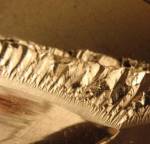Researchers at Cambridge University are working on a new process for creating solar-grade silicon that will be up to 80% more efficient in terms of energy consumption and cost and 90% less carbon dioxide intensive in production.
While silicon is the second most abundant element in the earth’s crust, turning what is extracted into solar grade silicon – 99.9999% purity – can be an energy intensive and therefore expensive process, one that also generates a significant quantity of carbon dioxide. While energy payback times can be as little as 1 year in the case with REC solar panels, for some modules it can be as much as 6 years.
Based on a procedure known as the FFC Cambridge process, the new modification pioneered by Dr Antony Cox has seen FFC used with silicon for the first time and is now in its final research and development stages.
The two-stage process uses white sand and calcium chloride as raw materials. Tablets of compressed sand are immersed in a calcium chloride electrolyte and heated to 900°C. The silicon in sand is present as an oxide and during the process, oxygen atoms are ionised, which then migrate to the anode and are discharged as oxygen; the only by-product of the reaction.
In the second stage, an electro-refining process within the same cell takes silicon from 99.99% purity to the required 99.9999% purity.
“Crucially, this process requires minimal energy consumption, generates O2 rather than CO2 as a by-product, and is easily up-scalable because it involves fewer production stages,” says Dr Cox.
Dr. Cox believes the process will reduce the cost of manufacturing solar-grade silicon from around USD $40–$200/kg currently to a maximum of $8/kg. With silicon being the most expensive part of a module, the savings will be reflected in significantly cheaper solar panels; with the environment also benefiting.
Source
Imaged credit: BT Usdin on flickr












































